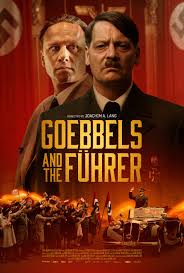
GOEBBELS AND THE FUHRER
Germany, 2024, 121 minutes, Colour.
Robert Stadlober, Fritz Karl, Franziska Weisz.
Directed by Joachim Lang.
While films about the Third Reich have focused on Hitler, especially Downfall, in which Joseph Goebbels played a central role, there have not been many films which have focused on Goebbels himself as a central character. This is very much the case here.
An initial statement indicates that the screenplay is based on the verbatim texts by Goebbels and others, that each line is authentic. And, throughout the film, there are insertions, especially of Goebbels and Hitler, from actual film footage (indicating that the actors here resemble Goebbels and Hitler significantly, Robert Stadlober, diminutive, limping, smiling and sneering as Goebbels, Fritz Karl, however, rather lower key as Hitler).
And the question to be asked: what is a 21st-century audience to make of Goebbels, as a person, his role in the Third Reich, the propagandist, mastermind of policies, his loyalty to Hitler? There are many indications throughout this film.
There is also the issue of him as a person, his personality, his ambitions, his snobbery, smug, but also his relationship with women, his affairs, especially with the Czech actress, Lida Baarova. Then there is his marriage to his wife Magda, his infidelities, her reactions, and the number of their children. In this regard, Magda’s special friendship with Hitler is significant but also the fact that Hitler was aware of Goebbels’ liaisons, did not want them to undermine aspects of government, intervened that Goebbels and Magda would make impact to stay together.
There are also some glimpses of the other leaders of the Third Reich, reminding audiences of who they were, what they did, and indications of Goebbels assessment of them.
The main focus of Goebbels’ activity is on his propaganda, the formulation of policies, pragmatic rather than principled, press, radio, cinema, his adapting them but always especially loyal to Hitler himself.
The 20th century audience might wonder how Hitler could have achieved such power, such influence on the German nation and how men like Goebbels could rise to such status of influence in German history and in world history.
- Audience knowledge of the Third Reich, the rise of National Socialism in the 1930s, knowledge of Goebbels, Hitler?
- The film based on documents, verbatim words, visuals of the period, footage of Goebbels and Hitler, intercut with the performances for the film?
- The film offering the outline of Goebbels’s life, when young, intelligent, his studies, writing, the attraction to National Socialism, the loyalty to Hitler, continued support, his involvement in propaganda, policies, the use of the media, the press, his interest in films, Leni Riefenstahl and her film of the Berlin Olympics, his attitude towards the Nazi leadership, his personal life, relationship with women, marrying Magda, the number of children, his relationship with the actress, public, Hitler intervening with Goebbels and with Magda, arranging the pact between them? His continued ambitions, the ending of the Third Reich, his achievement, with Magda and the children, suicide?
- The structure of the film, the focus on Goebbels, moving back and forth in time? Particular events and perspectives throwing light on his char press, radio, film, and its development and changes?
- The performance of Goebbels, impersonation, his personality, ambitious, snob, smug, his manner with the actress, with Magda? The scenes with the children?
- Magda, age, previous marriage, the children, the relationship with Goebbels, the humiliation of his liaisons, her friendship with Hitler, the issue of divorce, Hitler and the pact her own relationships, the death and the children?
- Goebbels in action, his creativity, his writing, his policies, issues of propaganda, shrewd, opportunist? In favour, moments out of, his adapting to Hitler?
- The port of Hitler, more realistic than some portraits, showing the less fanatical side in day by day events, his exercise of power, diplomacy and not, his quiet ruthlessness, the public appearances, the insertion of actual scenes? His militancy against the Jews, not admitting defeat, the relationship with Eva Braun, our given to Goebbels, the decision for death?
- The glimpses of the other Nazi leaders, Goering, Himmler, Boorman, Speers and the others, their roles, their manner, the characters?
- Goebbels, a final success, but too late, the Russians, the final days in Berlin, the decision for death?
- The impact of this kind of history for 21st-century audiences?